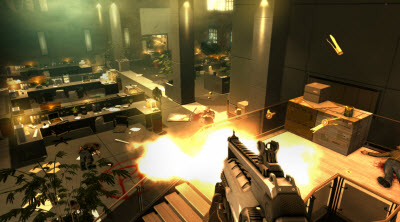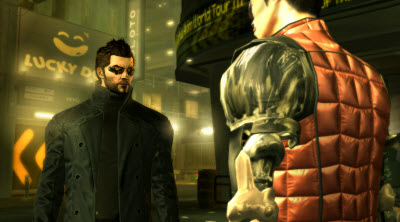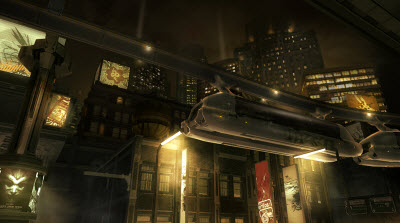 The Power to Move You
The Power to Move You
Deus Ex: Human Revolution is a very tough game if you choose a typical difficulty level, just like its predecessors. It’s refreshing compared to a lot of modern games that have become very easy. Enemies can quickly take you down in three or four shots if you aren’t careful. The boss fights are very unforgiving, even at the easiest difficulty level. Deus Ex: Human Revolution challenges you to become better at the game, and it rewards you significantly when you do.
It’s easy to die in this game. While you can run through the game with guns blazing as long as you carefully use cover, the game rewards you for playing stealthily. You can play through the game without ever getting caught. You can also play through the game without killing people through the use of non-lethal takedowns and tranquilizer guns. The game rewards you for doing both (with a significant “ghost” award for completing a mission without getting caught).
The game actually controls quite nicely, though the gameplay does feel like it’s littered with a few too many cut scenes. When you fall from a high ledge, it shifts to a cut scene that shows a field of electricity slowing you down. When you knock an enemy out, it shifts to a cut scene of Jensen executing a fancy close-quarters-combat move that takes them down. When you want to kill an enemy in close range, you get another cut scene of Jensen shanking his foe with retractable blades built into his arms.
There’s a wide variety of guns in the game — both lethal and non-lethal — and you can upgrade those guns with weapon kits to suit your play style. I personally chose to try and play the game while using exclusively tranquilizer weapons and non-lethal takedowns, but it did get a little frustrating because ammunition for those guns is so limited and the takedown cut scenes leave you standing in plain sight.
Most abilities — including a melee takedown — consume energy. While you have multiple energy cells, only one cell recharges naturally. Even with upgrades, it can take a while to charge. You have to consume sparse food to recharge your other energy cells, and it’s easy to get caught without an energy cell when you need to run for it or if you want to take down one more enemy with a non-lethal takedown.
Paradise Lost
Killing and sneaking aside, there’s a whole world to explore that is both visually stunning and disturbingly subdued. As you walk through the streets of Detroit, the trash and drug addicts on the street paint a picture of a dystopia where once-great American cities have fallen from grace and the government has started to lose control. The designers used a vibrant black and gold color scheme throughout the entire game, giving it a unique look when compared to other color schemes seen in dystopic games like Homefront or the newest entries to the Fallout series.
Deus Ex: Human Revolution’s world is a vibrant cyber-punk renaissance that feels part Blade Runner and part renaissance era, a-la Assassin’s Creed 2. For every chip of the world’s swarming technological landscape you see in Adam Jensen’s world, there’s a piece of gorgeous architecture or art that will literally stop you in your tracks as you take in the sights. There’s even more to see for those interested in exploring the sprawls present in Deus Ex — and, again, the game rewards you for seeing all its sights.
Whether it intends to or not, Deus Ex: Human Revolution also has to show down against the bold reds of BioWare’s supergiant sci-fi franchise Mass Effect or the bright, vivid neon blues of Nintendo’s Metroid Prime series. The game’s artists had to conceive a world that would stand apart from not only other dystopic futuristic pieces, but the entire sci-fi genre, lead artist Jonathan Jacques-Belletete told VentureBeat’s Dean Takahashi. To the team’s credit, it succeeded in spades.
The soundtrack is equally subdued and brooding. Rather than bold orchestral jams that roll alongside sci-fi behemoths like the Mass Effect series, Deus Ex: Human Revolution uses a softer sound palette that feels more electronic than orchestral. There are few clashing high-profile crescendos and it feels like the whole soundtrack runs at a softer volume. From the game’s sweeping chorus-laden opening track Icarus to the sounds of the streets of Lower Hengsha, it never feels like the music is trying to grab your attention. It sits in the back and contributes to the experience.


